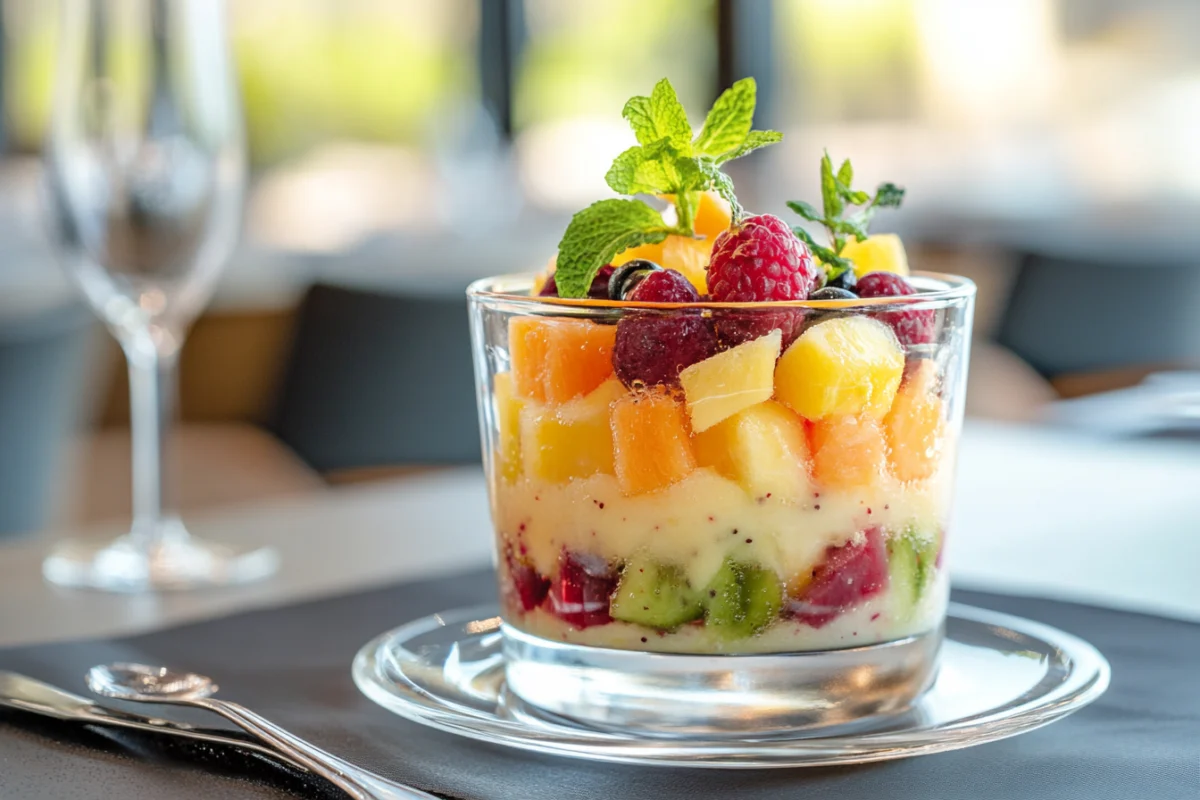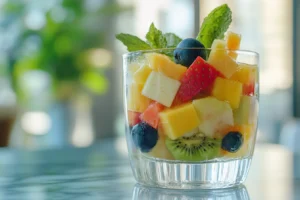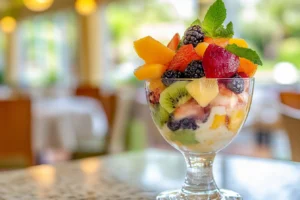Are fruit cups naturally a healthy choice? This article explores the nutritional value of fruit cups. We’ll examine their ingredients, natural benefits, and potential drawbacks. Let’s see if these convenient snacks truly support a healthy lifestyle.
The Appeal of Naturally Sweet Fruit Cups
Fruit cups offer convenience. They are portable and easy to eat. Many see them as a healthy snack, and they are often marketed as such. However, are they naturally beneficial for you? These pre-packaged portions are available in many stores. They seem like a quick and easy way to get your daily fruit. Naturally, this makes them an appealing choice for busy people. Additionally, their long shelf life makes them a practical option.
Examining the Natural Ingredients in Fruit Cups
Fruit cups typically contain pieces of fruit. These could be peaches, pears, pineapples, or mixed fruits. The natural fruit provides some fiber and some nutrients, but it’s essential to look at the entire picture. Naturally, whole fruit has a better nutritional profile than processed versions. However, many fruit cups also include added liquids and sweeteners, making their overall composition less straightforward.
Are the Natural Sugars the Only Concern?
The type of sugar in fruit cups matters. Many products use natural fruit juice or syrups as the packing liquid. Accordingly, they do provide some sweetness. However, they also can greatly increase the sugar content. While fruits have natural sugars, added sugars are a concern. Therefore, it is important to examine the packaging and understand the difference. Moreover, the processing the fruit undergoes changes how the sugar is handled by your body.
Are All Fruit Cups Created Naturally Equal?
Not all fruit cups have the same nutritional content. Varieties abound, and some choices are healthier than others. It is crucial to know how to choose wisely. Another consideration is how much processing the fruit has undergone. Furthermore, the type of liquid the fruit is in can also change its benefits. Likewise, some brands focus on all natural components while others include artificial flavors and colorings.
The Naturally Good and Bad in Fruit Cups
Fruit cups can provide some nutrients. For example, they may have a small amount of fiber. Moreover, some fruits are a source of vitamins. Nonetheless, many fruit cups are very high in added sugar. Hence, this can negate some of their natural health benefits. Also, the natural fiber levels may be reduced during processing.
Naturally Occurring Vitamins in Fruit Cups
Some fruits in cups contain naturally occurring vitamins. For instance, peaches are a source of vitamin A. Additionally, pineapples offer vitamin C. However, the levels of these vitamins may not be as high as in fresh fruit. Especially, if the fruit is processed. Furthermore, the storage of the fruit cups can affect the vitamin levels over time.
Added Sugars: The Unnatural Problem
The natural sugar in fruit is fine. However, many companies add extra sugar. This extra sugar contributes to weight gain. Therefore, it can negatively affect your health. This is a problem that reduces the natural health benefits of the fruit. Meanwhile, some products use artificial sweeteners. Thus, these also have their drawbacks. Accordingly, it is vital to carefully check labels.
Naturally Healthier Alternatives to Traditional Fruit Cups
Are there better choices than most pre-made fruit cups? Indeed, there are. Choosing naturally fresh fruit or creating your own fruit mixtures can be a great solution. Making healthier fruit cups at home is easy. Comparatively, they have less added sugar and more nutrients. Also, you can use a greater variety of fruit than what you might find in store bought options.
Making Your Own Naturally Healthy Fruit Cups
Making your own fruit cups allows complete control. Initially, you can use naturally sweet fruits like berries or melons. You could also add a splash of water instead of sugary syrup. Also, you can avoid extra sugar by using no-sugar-added yogurt. Finally, it is important to understand that natural does not always equal healthy. Moreover, you have the freedom to choose fruits that are at peak freshness.
Choosing Naturally Fresh Fruits
The first step is choosing fresh, natural fruits. Accordingly, select in-season options for the best taste. This also provides the most nutrients. Another benefit is that you know exactly what you are eating when you buy fresh. Ultimately, you are selecting natural goodness. Furthermore, you are supporting local farmers and reducing your carbon footprint.
Using Natural Yogurt Instead of Sugary Syrup
Plain yogurt is a great natural alternative to sugary syrup. Specifically, it adds some protein. Moreover, it offers extra calcium. Undoubtedly, using plain yogurt will make your fruit cup healthier. Chiefly, the natural flavor compliments the fruit well. Additionally, using greek yogurt adds a richer and more filling texture.
Considering the Natural Fiber Content
Naturally, fiber is key for good digestion. It helps you feel full. In addition, it supports a healthy gut. Most natural fruits are sources of fiber. The amount of fiber in pre-packaged fruit cups can vary a lot. Whereas, eating the fruit whole has the most fiber. Similarly, the peel of many fruits contains a higher concentration of fiber than the fruit’s flesh.
The Importance of Naturally Occurring Fiber
Fiber is an essential part of a healthy diet. It helps control blood sugar. Also, it helps with digestion. Thus, you feel full longer and eat less. Generally, most people should have more fiber. Consequently, that’s why naturally occurring fiber in fruit is so important. Hence, focusing on natural fiber sources can improve overall health.
Naturally Sourced Fiber in Fresh Fruit
Fresh fruits are a great source of fiber. Therefore, eating them whole will give you the most natural benefit. Basically, the peel of the fruit often has the most fiber. For example, an apple with the peel has much more fiber than a peeled one. Moreover, different fruits offer different kinds of fiber.
Fiber Content in Processed Fruit Cups
The fiber content of processed fruit cups is not naturally high. Specifically, processing can remove a lot of the fiber. Therefore, you get less of the good stuff. Eventually, you may not feel as full as if you ate the whole fruit. Furthermore, some brands add artificial fiber, which is less effective than natural fiber.
Naturally Smart Choices: Reading Fruit Cup Labels
Understanding natural labels is very important. Always read the nutrition information. Check the sugar content and list of items. Look for the word “added” in front of the sugar. Meanwhile, this will help you make smarter choices. Likewise, understanding the nutritional value allows you to make more informed choices.
Decoding Natural Nutrition Labels
The nutrition label shows calories and sugar. Furthermore, it lists protein and fiber. The serving size is critical to pay attention to. Undoubtedly, labels help consumers understand what they are buying. Accordingly, it is important to read them. Also, be aware that nutritional information is based on a specific serving size, so if you eat more you will get more calories and sugar.
Checking for Added Sugars
Look for words like corn syrup. Likewise, sucrose and dextrose are added sugars too. Therefore, if they appear early on the ingredient list, that is a red flag. Especially, pay attention to sugar grams per serving. Thus, you will know just how much sugar is present. Chiefly, it is vital to be aware that the sugar content in a single serving can quickly add up throughout the day.
Identifying Natural Preservatives and Additives
Some fruit cups contain additives and preservatives. These are used to extend the shelf life of the product. Comparatively, these are not naturally good for you. Nevertheless, try to find brands that use fewer additives whenever possible. Additionally, some preservatives can cause allergies or sensitivities in certain people.
The Role of Natural Fruit Cups in a Balanced Diet
Fruit cups can fit in a balanced diet. However, they should not be a main part of your daily food. Specifically, they can be a source of some nutrients on the go. Nevertheless, moderation is key. In addition, they may help when fresh fruits are not available. Indeed, they can be useful in situations where accessing natural whole fruit is not possible.
Naturally Incorporating Fruit Cups Into Your Meal Plan
When you choose fruit cups, make the natural choice. Specifically, limit them to one portion per day. Moreover, eat whole natural fruits most of the time. They are usually a better option. Therefore, balance is the key to a healthy lifestyle. Also, be sure to include a diverse array of fruits and vegetables into your diet to maximize your nutrient intake.
How Fruit Cups Compliment Other Foods
Fruit cups can add a bit of sweetness to a meal. For example, you might have one with a protein-rich breakfast. They complement meals by adding extra vitamins. However, avoid pairing them with other sugary foods. Likewise, try to use fruit cups with more protein and fewer carbs to keep your blood sugar stable.
Using Naturally Fruit Cups When You Are On the Go
Sometimes, it is hard to have fresh fruit when you are on the go. Fruit cups can be a good choice if no other natural options are present. Nevertheless, be conscious of the sugar content. Thus, look for naturally low sugar options. Meanwhile, you could also pack naturally healthy alternatives like vegetable sticks to help you stay healthy on the go.
Naturally Answering Your Questions
FAQs About Fruit Cups
Are fruit cups a healthy snack?
Fruit cups can be part of a balanced diet, but they are not always the healthiest choice. Some contain added sugars and processed fruits. Fresh whole fruit is always the best option. Ultimately, it is about balancing convenience with nutritional value.
Are fruit cups good for weight loss?
Fruit cups alone are not a good tool for weight loss. They can be high in sugar, adding to your calorie intake. Focus on fresh, whole foods with natural sugar instead. Basically, they should not be a primary tool for weight loss.
Can fruit cups replace eating fresh fruit?
No, they can’t replace fresh fruit. Fresh fruits have more fiber, vitamins, and less added sugar. Fruit cups can be a quick snack but don’t rely on them all the time. Specifically, they are not a substitute for the nutrients available in a naturally whole fruit.
Are fruit cups okay for diabetics?
Diabetics should be careful with fruit cups because of the sugar. Choosing varieties with no added sugar can be a better choice. Also, make sure to look at the label for natural sugar content. Therefore, it’s always best to consult a medical professional for tailored guidance.
Conclusion
Fruit cups can be a convenient option in a pinch. However, it is important to read labels carefully and to choose naturally healthier options. While they offer some natural nutrients from fruits, many contain added sugars and lack the fiber of whole fruit. Therefore, when possible, choose fresh, whole fruits as your primary source of fruit intake. Ultimately, making informed choices can help you maximize the natural benefits of fruit while limiting the negative impacts of processed snacks. Consequently, by being aware of the ingredients, you can make better decisions for your health. Always aim for balance and variety in your diet, and prioritize naturally occurring nutrients whenever possible.
Fresh fruits like apples, oranges, or berries paired with a splash of freshly squeezed juice can be prepared quickly. For those looking to explore more creative options, dishes such as mini pancakes made with fresh ingredients or Filipino sinigang inspire new ways to incorporate fruits and vegetables into everyday meals.



